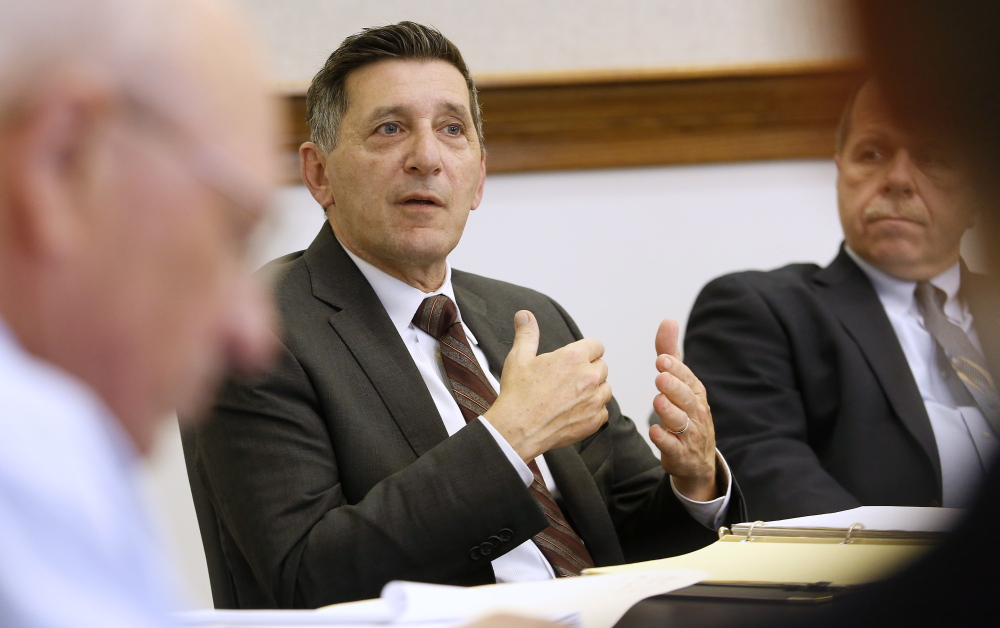The nation’s top drug policy official said Thursday that arrest and incarceration is not the key to solving the state’s drug problem, but he also said legalizing marijuana would be counterproductive.
“We want to use every opportunity to move people away from the criminal justice system but we don’t think legalization is the answer,” said Michael Botticelli, acting director of the Office of National Drug Control Policy, who toured a Portland recovery center and met with city officials and substance abuse professionals Thursday.
Botticelli also was in Bangor on Wednesday, where he announced $7.5 million in funding for 19 community coalitions in Maine that are working to develop holistic approaches to preventing drug abuse.
Botticelli said he chose Maine to highlight the new approach because, like many other states, it is dealing with a severe drug-abuse problem spurred by the abuse of prescription painkillers.
The number of people seeking treatment for opiate addiction in Maine climbed from 2,291 in 2004 to 4,801 in 2013, with the number seeking treatment for heroin increasing the most.
Maine spent $43.7 million on substance abuse treatment in 2013, down 7 percent from 2010. The cost of drug and alcohol abuse in Maine is an estimated $1.4 billion per year when including costs associated with medical treatment, crime and incarceration.
A study released this summer found that, based on data from 2012, Maine doctors wrote 21.8 prescriptions per 100 residents for extended release opiate medications such as OxyContin, more than twice the national average of 10.3 per 100 people.
Botticelli said the Obama administration has increased federal funding for treatment and prevention to its highest level in 10 years based on the premise that helping people stop using drugs, or persuading them not to start, is the best way to curtail prescription drug abuse and heroin addiction. The administration has de-emphasized treating abusers as criminals, but that does not equate to supporting legalization, he said.
Portland voters endorsed making marijuana legal by a 2-1 ratio in November 2013. Voters in Lewiston and South Portland have similar referendums on their ballots this fall.
Botticelli said legalizing marijuana increases the impression that it is harmless. However, early marijuana use has been linked to dependency on the drug and a drop in IQ scores, he said.
“Youth now do not see great harm associated with marijuana use,” he said. He added that with legalization, he worries that legal marijuana suppliers will employ marketing tactics used by the tobacco industry.
Meeting with Portland’s Substance Abuse Subcommittee, a cross-section of people working in treatment and recovery convened by Mayor Michael Brennan, Botticelli was asked what he would recommend to break the cycle of addicts who are arrested, jailed and then start using drugs again after their release. He said community partnerships need to focus on providing access to jobs, housing and education to those who have criminal records stemming from substance abuse.
He said his office has worked with the Department of Housing and Urban Development to provide those who are released from jail with better access to housing, and worked with the Department of Education to help people with criminal records get financial aid and loans.
He said the office also supports a “Ban the Box” initiative, referring to the box on job applications where applicants indicate whether they have ever been arrested. He urged employers not to consider the box, at least until late in the hiring process, to give people who have been charged with drug crimes a fighting chance.
Botticelli emphasized the important role parents play, especially when children are in middle school.
“Parents often feel powerless and nothing could be further from the truth,” he said. Only about 50 percent of parents have conversations with kids about substance abuse, he said. “Parents often don’t know how to have those conversations with kids.” He commended the work of groups like 21 Reasons, which encourages parents to feel comfortable asking their children where they are going and whether they will have access to alcohol.
Earlier in the day, Botticelli visited the Portland Recovery Community Center, which serves as a focal point for several recovery programs.
Steve Cotreau, program manager at the center, said Botticelli visited with people in recovery and their family members. The center is built on the concept that people new to recovery benefit greatly from people who are further along.
“If you . . . meet somebody that’s done whatever it is you’re dreaming of, then it becomes a reality, it becomes possible,” Cotreau said. “The main thing that comes out of that is hope.”
Botticelli, who has been public about his own recovery from alcoholism, was inspirational, Cotreau said.
“Even if I don’t aspire to work at the White House, it’s extremely comforting to me as a person in recovery to know the person there that’s talking about policy has experienced it,” he said.
Send questions/comments to the editors.



Success. Please wait for the page to reload. If the page does not reload within 5 seconds, please refresh the page.
Enter your email and password to access comments.
Hi, to comment on stories you must . This profile is in addition to your subscription and website login.
Already have a commenting profile? .
Invalid username/password.
Please check your email to confirm and complete your registration.
Only subscribers are eligible to post comments. Please subscribe or login first for digital access. Here’s why.
Use the form below to reset your password. When you've submitted your account email, we will send an email with a reset code.